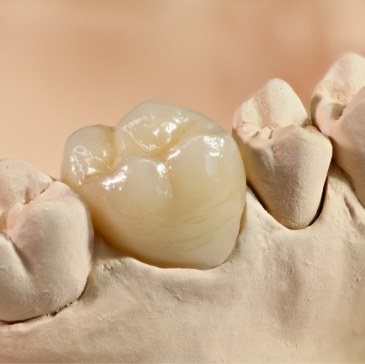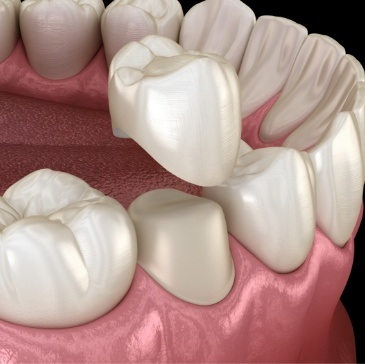Dental Crowns—Waco, TX
Repair, Restore, and Protect Your Damaged Teeth

Did you know that tooth enamel is the hardest material in the human body? Unfortunately, there are still plenty of ways you may find yourself with broken or weakened pearly whites. Thankfully, at Premier Family Dental, we can repair, restore, and protect your damaged teeth with custom-made dental crowns in Waco! These beautiful restorations can help your smile look and feel like new again for many years to come. Read on to find out how and give us a call today to see if you can benefit from a dental crown.

Why Choose Premier Family Dental for Dental Crowns?
- Convenient Same-Day CEREC Dental Crowns
- Natural-Looking Porcelain
- Locally Owned Dental Practice in Waco
What Is a Dental Crown?

Dental crowns are essentially tooth-shaped caps that fit snugly over a tooth, encapsulating the entire portion above the gumline. This restores the strength of the tooth and allows it to function properly once again. Simultaneously, it protects the damaged or weakened tooth underneath from further damage or decay.
What’s more, since dental crowns cover the visible part of your tooth, we can completely redesign its size, shape, and color as well. Dental crowns can be custom-made from a variety of materials, but all-porcelain dental crowns are a popular choice. This material is well-known for its durability, stain resistance, and ability to mimic the appearance of healthy tooth enamel. Depending on your preferences and where the dental crown will be placed in your mouth, your Waco dentist will help you determine which crown is best during your consultation.
Why Might I Need a Dental Crown?

Sometimes, decay or damage to your teeth is so extensive, a dental filling won’t do the trick. When this happens, a dental crown may be the best option for restoring your tooth. Crowns are often used when:
- You’ve broken a tooth.
- You need a cosmetic dentistry enhancement.
- The decay is extensive.
- A filling has fractured.
- You’ve received root canal treatment.
The Process of Getting a Dental Crown

With a traditional dental crown, typically at least two appointments are required. During the first, the teeth are prepared, and impressions are taken. The crown is made at a separate dental lab and is placed during the second appointment. Generally speaking, this process can take a couple of weeks.
However, if you have a dental crown made using the CEREC system, there will be no need to wait. In just one appointment, we can take a digital impression of your mouth and use it to mill a natural-looking crown that fits perfectly on your tooth. We can then place the completed dental crown right away, meaning you won’t have to wait to enjoy a fully restored, dazzling smile.
Benefits of Dental Crowns

While there are plenty of dental restorations that can help repair broken or decayed teeth, dental crowns offer unique benefits such as:
- Versatility: From tooth decay to damage to cosmetic imperfections, dental crowns are an excellent way to address many different types of issues.
- Lifelike appearance: Dental crowns made entirely of dental porcelain are strong and incredibly lifelike. Once placed, they’re practically indistinguishable from natural teeth!
- Prevention of future issues: The durable barrier provided by a dental crown is a reliable way to prevent worsening damage and serious infections.
Understanding the Cost of Dental Crowns

Dental crowns play a vital role in restoring damaged teeth, ensuring both functionality and aesthetics. However, the cost factor can vary widely based on several key determinants. Let's delve deeper into the intricacies of dental crown expenses to grasp why quality outweighs affordability.
Factors that Affect the Cost of Dental Crowns

The expense of dental crowns is influenced by various factors. Firstly, the extent of dental damage dictates whether additional procedures like root canals are necessary prior to crown placement. Furthermore, the material used, ranging from traditional options like amalgam to more aesthetically pleasing choices such as porcelain, impacts the cost. When we meet you in person, we’ll be able to tell you more about the options available to you and how they might influence the overall cost of your treatment.
It's imperative for patients to understand that prioritizing quality over cost ensures durability and satisfaction with their dental restoration, but also to be aware of what your treatment will cost you so that you can budget effectively for care.
Does Dental Insurance Cover Dental Crowns?

Dental insurance typically covers a portion of the cost for dental crowns, categorizing them as a major procedure. While coverage varies, it's common for insurance to reimburse around 50% of the expense if the treatment is deemed medically necessary. Patients are advised to consult their dental team to confirm coverage specifics, as individual insurance plans may differ. By verifying benefits beforehand, patients can make informed decisions regarding their dental care.
Other Options for Making Dental Crowns Affordable

Even if you don’t have insurance, there are a couple of options available to you that may make your care more affordable. For one, we have an in-house membership plan; for a flat monthly or annual fee, you can get several free checkups each year as well as large discounts on other services you receive from us.
If you’re unsure if you can pay the entire cost of your dental crown at once, you might also be interested in financing from Lending Club and CareCredit. Both firms offer low-to-no interest terms to patients who qualify.
If you’re interested in what financial services we have to offer, give us a call and we’ll be happy to talk to you about how you can make your care affordable.
Dental Crown FAQs
Has your dentist told you that you need a dental crown? You may still have some unanswered questions about what you can expect. Here are the answers to some of the most popular queries we receive about dental crowns in Waco. If you don’t see the information that you’re looking for below, don’t worry. Give us a call and we’d be happy to answer your questions and schedule you for an appointment.
ARE DENTAL CROWNS PERMANENT?
Dental crowns are not permanent, but they are considered a long-term solution. On average, they can protect your tooth for anywhere between 5 to 15 years. Since a small amount of tooth enamel needs to be removed to prepare your tooth for the crown, and enamel doesn’t grow back, this procedure is irreversible. The affected tooth will always need to be covered with a crown going forward. That being said, crowns protect the underlying tooth from additional damage, helping it to survive for much longer than it would have otherwise.
DO DENTAL CROWNS GET CAVITIES?
It is impossible for a dental crown itself to develop cavities, but the tooth underneath can still be affected by decay. A crowned tooth actually has about the same risk of decay as an uncrowned tooth. Poor oral hygiene makes it possible for bacteria and plaque to form around the gumline where the tooth meets the crown. They can then travel underneath the crown and weak havoc on the underlying tooth. You can prevent cavities in crowned teeth the same way you do with your natural teeth. Brush, floss, and see your dentist every six months!
DOES IT HURT TO GET A DENTAL CROWN?
Just like when you get a filling, your dentist will numb the tooth that they will be working on when you get a crown. This way, you will feel perfectly comfortable throughout the process of getting your new crown. However, your tooth may feel sensitive for the next few days, especially if you’ve also undergone a root canal. Taking over-the-counter pain relievers as directed should help. If discomfort worsens, give us a call!
IS IT A DENTAL EMERGENCY IF YOUR CROWN FALLS OFF?
Losing a dental crown isn’t an urgent dental emergency, but you should still give your dentist a call and schedule an appointment within a few days. The only time you’d need to be seen sooner is if the underlying tooth has sharp edges that could harm the soft tissues in your mouth. Even if your tooth doesn’t hurt, it is still important to have the crown reseated or replaced fairly quickly, as it is more vulnerable to decay, breakage, and other damage. Until your appointment, try to avoid chewing with the tooth. When your visit rolls around, bring your crown with you.
What Happens If You Wait Too Long to Get a Dental Crown?
If your dentist recommends a dental crown, you should schedule the treatment promptly. Putting it off will only worsen the harm to your smile.
Dentists will only suggest a dental crown when you really need one. Given that fact, waiting too long to get one exposes your tooth to more chewing forces, food debris, and bacteria. Such exposure causes pre-existing decay to worsen, further damaging your oral health. It could even compromise your tooth to the point that it needs a root canal or extraction.
To avoid such effects, please get a dental crown soon after your dentist suggests one.
Are Dental Crowns Safe?
Our dental crowns are very safe and effective. They shouldn’t cause any damage to your tooth, gums, or other body parts.
For starters, note that our office’s dental crowns are made only from porcelain. They don’t contain any mercury or similar metals, so they’re 100% non-toxic in nature. A patient is also unlikely to experience adverse reactions to dental porcelain, and any such reactions can be easily managed.
The placement process for dental crowns is also safe for patients. While a dentist may remove slight amounts of enamel to ensure a good fit, the final cap will protect your tooth.
Can Dental Crowns Be Whitened?
Sadly, modern dental crowns can’t be whitened like natural teeth. Their design ensures that they’ll always remain the same color.
It basically comes down to how teeth whitening works. Bleaching gel enters the enamel through tiny pores, breaking apart stains in the process. However, dental crowns lack such pores; a whitener can’t get inside them.
With all that said, you can work around this issue. An example would be to get teeth whitening before your crown is placed. By taking this approach, your final cap would match the shade of your smile.
Do Dental Crowns Feel Natural?
Dental crowns feel increasingly natural within a few days of their placement. As a result, they don’t usually cause unwanted or “odd” sensations for patients.
This natural feeling partly stems from the treatment materials. Since our dental crowns use durable porcelain, they can withstand chewing forces just as easily as enamel. Eating a meal with them shouldn’t feel strange to you.
Dental crowns also feel natural due to their custom nature. Each one is designed based on impressions of your tooth, so they usually fit snugly and precisely. That means your crown shouldn’t seem awkward or even noticeable to you.
